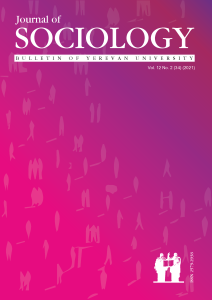Restrictions of establishing social bonds among the children deprived from parental care (on the case of children sheltered at the crisis centre)
DOI:
https://doi.org/10.46991/BYSU:F/2021.12.2.046Keywords:
social bonds, attachment, deprivation of parental care, abandonment, social relationsAbstract
The article reflects the circumstances accompanying the process of child deprivation from parental care, which limits or restricts the formation of stable and fundamental social bonds. Particularly, the article illustrates the findings of the study among 29 children deprived of parental care, who were sheltered at the Crisis Center for the period of 2019-2021. The findings of the study are interpreted in the context of social relations by T. Parsons, T. Hirschi, and J. Chris. The study showed that positions, approaches, and aspirations of establishing and maintaining social bonds by children are conditioned due to: 1) the child deprivation from parental care; 2) the nature of the action of becoming deprived of care, 3) decision making on child’s placement. The study also tackles the impacts of other accompanying circumstances within the discussed context.
References
Koulman Dzh. (2001). Kapital sotsial'nyy i chelovecheskiy. Obshchestvennyye nauki i sovremennost', 2001, № 3, (Perevod L. Strel'nikova, A. Stasenko), 121-139.
Bianchi S.M., Robinson J. (1997) "What did you do today? Children's Use of Time, Family Composition, and the Acquisition of Social Capital", Journal of Marriage and Family, Vol. 59, No 2, 332-344. DOI: 10.2307/353474
Bowlby, J. M. (1982). Attachment and Loss, Volume I, Attachment, 2nd Edition, New York, Basic Books.
Chriss, J. J. (2007) The functions of the social bond. Sociological Quarterly, 48(4), 689-712. DOI: 10.1111/j.1533-8525.2007.00097.x
Coleman J. (1998) "Social Capital in the Creation of Human Capital", American Journal of Sociology, vol. 94, 95-120. DOI: 10.1086/228943
Dufur M. J., Parcel T. L., McKune B. A. (2013) "Does Capital at Home Matter More than Capital at School? The Case of Adolescent Alcohol and Marijuana Use", Journal of Drug Issues, 43 (1), 85-102. DOI: 10.1177/0022042612462220
Herreros F. (2015). "Ties that bind: Family relationships and social trust", Rationality and Society, Vol. 27 (3), 334-357. DOI: 10.1177/1043463115593122
Hirschi, T. (2002). Causes of Delinquency (1st ed.). Routledge.
Karapetyan, T., (2019). "On terminology issues of the concept of deprivation of care of children", Banber, Yerevan University. Sociology, economy. 3 (30), 79-87.
Karapetyan T. (2021). "Qualitative measures of family functions affecting child deprivation", Katchar Scientific Periodical, 2021/1, RA NAS, International Scientific-Educational Center, Yerevan, 151-169.
Parsons, T., Platt, G. M., Jackson, T. (2013) The American University, Cambridge, MA, and London, England: Harvard University Press.
Pratt, T. C., Gau, J. M., & Franklin, T. W. (2011). Key idea: Hirschi's social bond/social control theory. In Key ideas in criminology and criminal justice (pp. 55-70). SAGE Publications, Inc., DOI: 10.4135/9781483388045.n5
Downloads
Published
Issue
Section
License
Copyright (c) 2021 Tatevik Karapetyan

This work is licensed under a Creative Commons Attribution-NonCommercial 4.0 International License.





